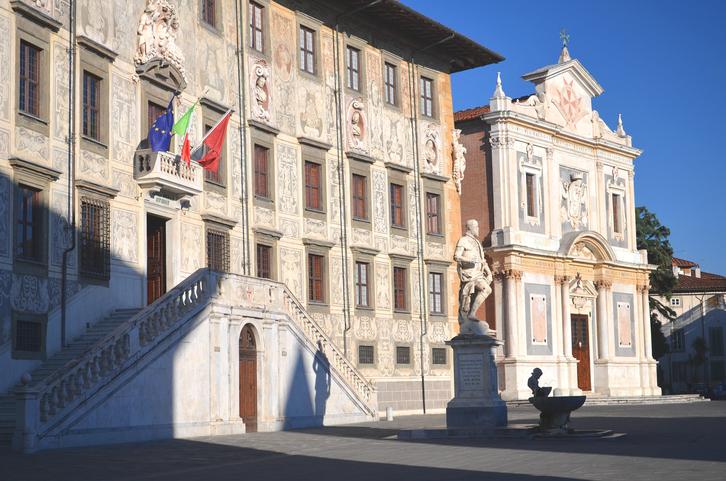Introduction
Italy, renowned for its timeless beauty, rich history, and culinary delights, also boasts a dynamic academic realm that attracts students from around the world. The country is known for its long-standing tradition of academic excellence and the impressive contributions its universities have made to various fields of study. This article aims to provide a glimpse into the thriving academic landscape of Italy, exploring its universities and the unique learning experiences they offer.
Italy’s higher education system is one of the most revered in the world, with a strong emphasis on academic rigor and research. The country is home to some of the oldest universities in Europe, dating back to the Middle Ages, and continues to uphold a tradition of intellectual pursuit and innovation. Today, Italy boasts a vast network of universities, both public and private, spread across its historical cities and picturesque countryside.
The universities in Italy offer a wide range of academic programs, catering to diverse interests and aspirations of students. From the humanities to natural sciences, engineering to arts, Italy provides a comprehensive education in various disciplines. These universities are known for their world-class faculty who are experts in their respective fields, ensuring that students receive a top-quality education.
One distinguishing feature of Italian universities is their commitment to research and innovation. Italy has a strong culture of scientific inquiry, and its universities play a crucial role in driving advancements in various fields. Students have the opportunity to engage in groundbreaking research projects, collaborate with leading researchers, and contribute to cutting-edge discoveries. This research-focused approach provides students with valuable hands-on experience and equips them with the skills and knowledge required to excel in their chosen fields.
In addition to academics, Italian universities also prioritize cultural and social experiences. The vibrant student life in Italy offers a rich blend of cultural events, extracurricular activities, and opportunities to connect with students from all walks of life. The universities organize various cultural festivals, music concerts, debates, and sporting events, fostering a holistic learning environment that goes beyond the classroom. Students have the privilege of immersing themselves in Italian culture, exploring historical landmarks, and enjoying the country’s diverse cuisine.
Overview of the Italian Higher Education System
Italy is renowned for its rich history, vibrant culture, and remarkable contributions to various academic disciplines. It stands as a beacon of knowledge and wisdom, offering a dynamic and diverse higher education system that has attracted students from around the world for centuries. In this section, we will delve into the key aspects of the Italian higher education system, shedding light on its structure, types of institutions, and entrance requirements.
At the heart of the Italian higher education system are its universities, which are the main centers for education and research. Italy boasts some of the oldest and most prestigious universities globally, dating back to the Middle Ages. These venerable institutions have a tradition of excellence, and their degrees are widely recognized and respected worldwide.
The Italian higher education system is divided into three main cycles: the first cycle, the second cycle, and the third cycle. The first cycle, known as “Laurea,” leads to a bachelor’s degree, lasting three years. It provides students with a solid foundation of knowledge and skills in their chosen field of study. The Laurea is awarded by universities and some other higher education institutions.
Following the completion of a Laurea degree or its international equivalent, students can opt for the second cycle, known as “Laurea Magistrale” or master’s degree. The Laurea Magistrale typically lasts two years and offers students a deeper understanding and specialization within a particular academic discipline.
For those aspiring to pursue advanced research or teaching careers, the third cycle, or “Dottorato di Ricerca” (Ph.D.), is available. The Ph.D. is awarded to students who successfully complete a program of original research and defend their thesis. This cycle typically takes three years, although the duration may vary depending on the field of study and the individual student’s progress.
Italian universities also offer a wide range of professional programs, known as “Istituti Tecnici Superiori” (ITS), which focus on specific technical and vocational skills. These programs are designed to address the needs of the labor market and provide practical training in various fields, such as information technology, tourism, and design.
Admission requirements vary depending on the level of study and the chosen institution. Typically, for a Laurea degree, students must hold a high school diploma or its equivalent. Entry into a Laurea Magistrale program often requires a Laurea or an equivalent international degree. Ph.D. programs usually have stricter admission criteria, including a master’s degree and a research proposal.
Furthermore, Italian universities often conduct entrance exams for certain disciplines, such as medicine or architecture. These exams assess students’ aptitude and knowledge in the respective fields and determine their eligibility for admission.
Prestigious Universities in Italy
Italy is a country well-known for its rich history, cultural heritage, and delectable cuisine. However, beyond these popular facets, Italy is also home to several prestigious universities that have nurtured countless brilliant minds and contributed significantly to the academic realm. In this section, we will delve into some of the renowned universities in Italy that have stood the test of time and retained their legacy of excellence.
One such institution is the University of Bologna, which holds the esteemed title of being the oldest university in continuous operation. Founded in 1088, this university boasts a remarkable lineage of notable alumni, including philosophers, scientists, and politicians. Its influence extends to the present day through its cutting-edge research and innovative teachings across various disciplines.
Moving on to the University of Padua, which was established in 1222, we find another venerable institution that has garnered widespread recognition. It is renowned for its innovation in scientific research and education, particularly in the fields of medicine, law, and engineering. The university has produced several Nobel laureates and is highly regarded for its world-class faculty and state-of-the-art facilities.
Italy’s capital, Rome, is home to the prestigious Sapienza University of Rome. Founded in 1303, it is one of the largest and oldest universities in the world. With a vast array of faculties and departments, Sapienza offers a diverse range of academic programs, attracting students from all corners of the globe. Known for its emphasis on interdisciplinary studies, this university fosters an environment conducive to the exchange of ideas and collaboration among scholars and researchers.
Not to be overlooked is the University of Pisa, which traces its roots back to 1343. This university is renowned for its contributions to scientific advancements, particularly in fields such as mathematics and physics. Its iconic leaning tower has become a symbol of the university, attracting visitors and academia alike. The University of Pisa continues to be a major center for research and innovation, attracting students eager to pursue excellence in their chosen disciplines.
Continuing along the ancient lineage of Italian universities, we encounter the University of Naples Federico II. Founded in 1224, it is one of the oldest public universities in the world and is named after its founder, Frederick II, Holy Roman Emperor. The university has played a vital role in shaping Italy’s intellectual landscape and has produced many renowned scholars, including philosophers and artists. It offers a broad range of academic programs and is esteemed for its esteemed faculty and research opportunities.
Lastly, we have the University of Milan, established in 1924. Known for its strengths in multiple disciplines, this university has gained prominence for its world-class research and vibrant academic community. With a focus on interdisciplinary studies, the University of Milan fosters an environment that encourages collaboration and the pursuit of knowledge across a diverse range of fields.
Specialized Fields of Study
Italy’s dynamic universities are renowned for their wide range of specialized fields of study. From ancient history to cutting-edge technology, these institutions offer a plethora of academic options for students seeking to dive deep into their areas of interest.
One of the most popular specialized fields of study in Italy is art and design. With a rich cultural heritage, Italy is home to some of the world’s most famous art and design schools. Students interested in pursuing a career in painting, sculpture, fashion, or architecture can find exceptional programs that nurture their creative talents and offer unique learning opportunities. The combination of traditional techniques with modern innovations makes these programs highly sought after by aspiring artists and designers from all over the world.
Italy’s tradition of culinary excellence has also shaped its specialized fields of study. The country boasts renowned gastronomy and hospitality schools, attracting students who are passionate about food and beverage management, culinary arts, and hospitality services. These schools emphasize both theoretical knowledge and practical skills, providing students with an immersive learning experience that equips them to excel in the culinary industry. Graduates from these programs often go on to work in prestigious establishments or even open their own successful restaurants.
For those inclined towards the sciences, Italy’s universities offer various specialized fields of study in this domain as well. Italy has always been at the forefront of scientific research and innovation, and its universities have established themselves as centers of excellence in disciplines such as physics, chemistry, biology, and engineering. Students pursuing these fields can benefit from state-of-the-art laboratories, collaborative research projects, and expert faculty who are dedicated to advancing knowledge and pushing the boundaries of scientific understanding.
Italy’s historical significance also contributes to its specialized fields of study, particularly in archaeology and ancient history. The country is home to countless archaeological sites and ancient ruins that serve as living classrooms for students interested in unearthing the mysteries of the past. Studying these fields in Italy offers a unique advantage, allowing students to immerse themselves in the cultural context and gain hands-on experience in excavations and historical preservation. It is a captivating field of study that appeals to those who are passionate about understanding human civilization and preserving our shared heritage.
Supportive Infrastructure for International Students
Italy’s dynamic universities not only provide top-notch educational programs but also offer a supportive infrastructure for international students. Recognizing the importance of creating a welcoming and inclusive environment, these universities have put in place a range of initiatives to assist international students in adjusting to their new academic and cultural environment.
One of the key resources available to international students in Italy is comprehensive support services. Universities across the country have dedicated international student offices that serve as a hub for assistance with various aspects of student life. These offices provide guidance and support on administrative matters such as visa and residence permit procedures, health insurance, and registration for courses. International student advisors are trained to address the unique needs and challenges faced by international students, offering personalized assistance and ensuring that they have the necessary information and resources to thrive academically and personally.
In addition to the supporting infrastructure within the universities, Italy also boasts an extensive network of associations and programs specifically designed for international students. These organizations offer a platform for students from different countries to connect, engage with the local community, and build social networks. For instance, the Erasmus Student Network (ESN) is a student-run organization that operates in many Italian universities, offering a wide range of social and cultural activities for international students. From city tours to language exchanges and cultural events, these programs facilitate integration and foster friendships among students from around the world, ensuring that no one feels alone or isolated.
The Italian higher education system is known for its commitment to student welfare, and this is particularly evident in the availability of affordable and student-friendly accommodation options. Most universities in Italy provide assistance in finding suitable housing for international students, whether it be student residences, shared apartments, or private rentals. This support is incredibly valuable, especially for students who might be unfamiliar with the local rental market or face language barriers. By offering guidance and resources, universities ensure that international students can easily find a comfortable and safe place to live while studying in Italy.
Moreover, Italian universities recognize the importance of language support for international students. While many courses are taught in English, universities have programs in place to help students improve their Italian language skills. Language centers and courses specifically tailored for international students are offered, enabling them to not only better integrate into the academic environment but also to fully experience Italian culture and society. These language programs serve as a bridge to connect students with a broader range of opportunities, such as internships, research collaborations, and cultural exchanges.
Conclusion
Italy’s universities are dedicated to providing a supportive infrastructure for international students. From comprehensive support services and student associations to assistance with housing and language learning, these universities ensure that international students feel welcomed, supported, and included. By fostering an environment that encourages cross-cultural understanding and collaboration, Italy’s academic realm offers an enriching experience for international students from all corners of the globe.
Exploring Italy’s dynamic universities provides a fascinating journey into the rich academic realm of the country. With its vibrant history, unique educational approach, and diverse range of subjects, Italy offers a remarkable platform for students to expand their knowledge and pursue their passions. Whether it’s diving into centuries-old libraries, engaging in lively classroom discussions, or immersing oneself in the country’s renowned cultural heritage, the opportunities for growth and discovery are unparalleled. From renowned institutions in cities like Rome, Florence, and Bologna to the lesser-known gems spread across the country, Italy’s universities cater to a wide range of academic interests and preferences. By choosing Italy as your destination for higher education, you embark on a transformative experience that not only broadens your intellectual horizons but also leaves you with cherished memories and lifelong friendships. So, dare to explore the academic riches that Italy has to offer, and embark on a journey that will shape your future in unimaginable ways.




